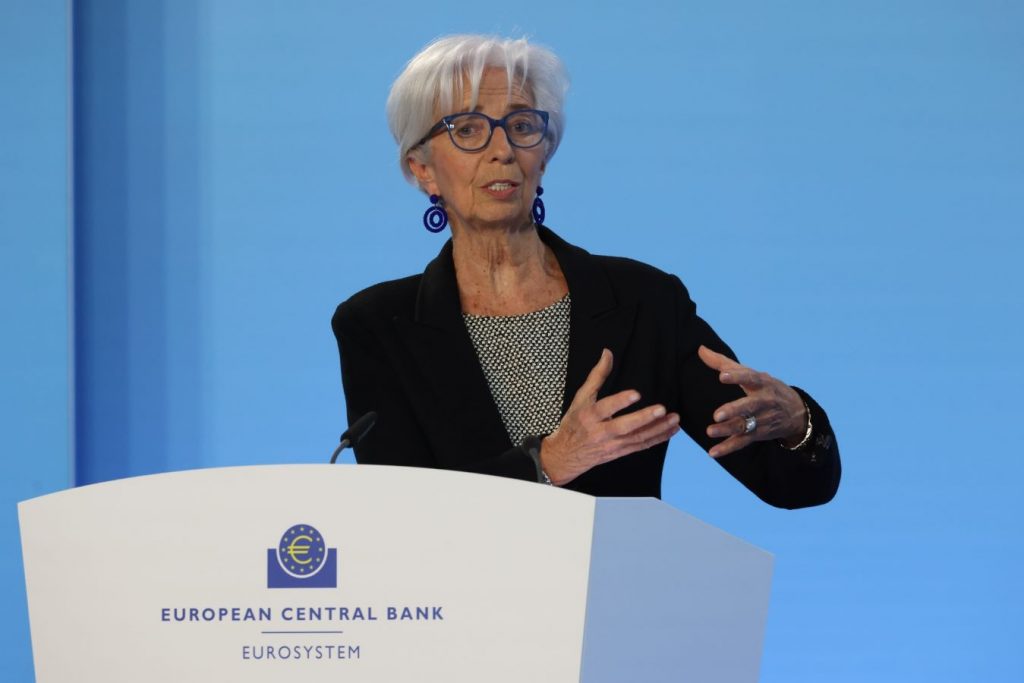Economists are scaling back their forecasts for the extent of the European Central Bank’s (ECB) interest rate reductions once they begin next week. This information comes from a Bloomberg survey. Survey participants expect the initial announcement of six quarter-point cuts to the deposit rate, currently at 4%, to occur next week. This is one less cut than predicted prior to the Governing Council’s last policy meeting in April.
Strengthened Expectations for June Cut
Since then, officials, including President Christine Lagarde, have bolstered expectations for a June rate cut, positioning the ECB ahead of the Federal Reserve and the Bank of England. However, a surprisingly strong economic rebound in Europe is fueling debates about future actions. Persistent wage pressures and heightened inflation risks are also contributing to these discussions. Hawks like Executive Board member Isabel Schnabel advocate waiting until September before considering a second cut. Bundesbank President Joachim Nagel also supports this cautious approach. Additionally, economists believe a cautious Fed will constrain the ECB’s flexibility.
Communication Challenges Ahead
Communicating the ECB’s strategy without committing to a specific course may be the biggest challenge for Lagarde. “It will be difficult to justify their confidence in the timing of the cut while providing no guidance on subsequent cuts,” said Hugo Le Damany, an economist at AXA Investment Managers. He predicts the ECB will halt monetary easing next June after just five steps, with the deposit rate at 2.75%.

Warren Buffett Hints at Mystery Stock Reveal
Warren Buffett, the legendary investor and CEO of Berkshire Hathaway, is set to captivate audiences once again at the company’s…
Inflation Remains a Key Concern
Inflation’s remains the primary risk to the euro-zone economy, according to respondents, followed by the impact of the US presidential election and geopolitical tensions. Inflation likely accelerated slightly in May after holding at 2.4% for two months. Wage growth unexpectedly remained robust at the start of 2024. This has increased pressure on service prices, which continue to rise at nearly 4%.
Quarterly Economic Projections in Focus
Wage growth unexpectedly remained robust at the start of 2024. This has increased pressure on service prices, which continue to rise at nearly 4%. Approximately 84% of economists believe this emphasis makes rate adjustments every three months more probable. However, 92% say this does not preclude interim actions. Highlighting this possibility, France’s Francois Villeroy de Galhau has cautioned against ruling out another rate cut in July.
Diverging Views Among ECB Members
Survey respondents do not foresee changes to the ECB’s projections this time, except for an upward revision of the 2024 economic growth forecast following a better-than-expected first quarter. “We anticipate diverging views between doves and hawks on the Council,” said Fabio Balboni, an economist at HSBC. “Doves are eager to remove all policy constraints, while hawks prefer a cautious approach until they are confident that inflation is under control.”
Market Implications and Speculations
“This could make it challenging for the ECB to provide clear guidance on future rate paths beyond the current meeting, potentially creating market uncertainty and volatility,” he added. Traders have recently reduced their expectations for the number of rate cuts the ECB will deliver this year. They now fully anticipate two cuts, with a one-in-three chance of a third, compared to just one cut with a 20% chance of a second in the US.
Comparisons with the US
While inflation in the US has significantly cooled, progress has slowed. This has prompted speculation that US borrowing costs may need to remain high for longer. It also raises questions about the implications for Europe. Almost three-quarters of respondents believe the euro zone has its own inflation dynamics and is not merely following the US. However, only 6% think the ECB can completely decouple from the Fed in setting rates.
Future ECB Actions
About 85% of respondents believe the ECB will need to keep rates higher than otherwise necessary if the Fed delays easing, to counter inflation pressures from a weaker euro. Most economists think the ECB can cut rates three times if the Fed does not ease. Europe may, in fact, be experiencing similar trends to those hindering Fed easing, according to Nomura’s Andrzej Szczepaniak.
“With stronger economic activity data, resilient demand, and a robust labor market, we believe the ECB will end up cutting only gradually to maintain some level of monetary restrictiveness,” he said. “Stronger-than-expected wage growth and persistent services inflation also support this cautious approach.” “Cutting too much too quickly could unnecessarily reignite inflation and reverse the ECB’s hard-earned progress.”
Acquire a 2-year subscription to The Wall Street Journal: Enjoy daily delivery six days a week and access WSJ Digital. Stay fully informed about finance, politics, healthcare, and global events with this comprehensive package. Dive into expert insights and trustworthy evaluations to broaden your perspective.

